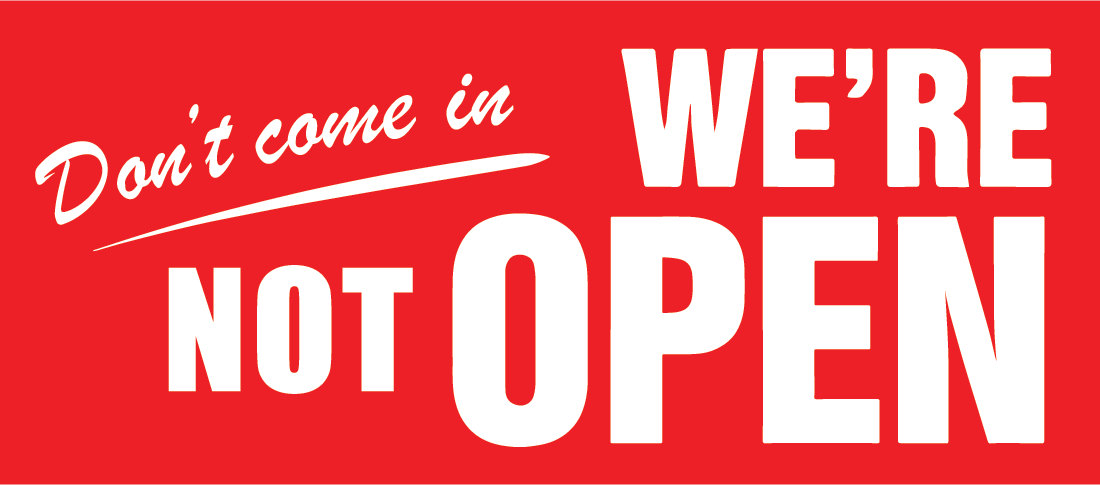
3 Things Marketers Should NOT do in a Possible Recession
3 Things Marketers Should NOT do in a possible recession
The “R word.” It’s been bandied about a lot this last year, especially with the debt ceiling also jockeying for the front page. “Recession” is having a Chicken Little-ish moment. But layoffs are happening, and those cuts usually bleed into marketing spending as well.
And all that economic heat usually drives marketers to make some bad / hasty / short- sighted decisions. Don’t be that marketer. Avoid these three mistakes to weather the storm and emerge stronger for it.
#1 Don’t turn off your open sign
Many companies see marketing as an expense rather than an investment—so recession-driven cuts seem like cost savings. But that makes zero sense. Marketing drives customers. Customers drive revenue. Revenue drives business. If the neighborhood dry cleaner pulls the cord on their open sign—essentially turning off their marketing—what happens? Nothing good.
But doing the opposite—investing in marketing during economic uncertainty, can actually make a company stronger. At least that’s what the smarty-pants people at the Harvard Business Review say in their “How to Market in a Downturn” study. The folks at HBR showed that companies that maintain or increase marketing spend during a recession usually perform better during the recession than those that slash budgets. It makes sense. When competition for customer dollars is fiercest—like it is in a recession—you need a better story than the other brand to attract buyers. Without marketing, companies quickly lose visibility and shed market share, which can be even harder to recover from once the economy bounces back.
Instead, savvy marketers should focus on ways to optimize their marketing spending, pushing profitable products to the healthiest customer segments. You can also embrace more attributable and lower-investment digital channels like programmatic display, social media, and content marketing. A recession may not be the time to roll out a prestige TV spot during the Super Bowl, but it’s not time to duck and cover either.
#2 Don’t focus on the short-term
Recessions tend to generate a lot of performance-data myopia. People that were once visionary leaders start thinking small, looking to back fill sales, plug holes, and stem the tide of economic uncertainty. It’s a natural response, but it’s a distraction—and focus on short-term profits can take your eye off the long term goals.
It takes some courage to stay the course, but a consistent marketing investment pays off in the long run. Like the HBR study, a McKinsey & Company study showed that companies that invest in marketing during a recession also emerge stronger than those that cut back. Instead of abandoning ship, smart marketers invest in building brand awareness, customer engagement, and loyalty over the long term. By focusing on the big picture, companies can better weather the storm and be poised to take advantage of the upswell that comes when the economy recovers
#3 Don’t ignore changing customer realities
When times are good, strong brands can operate with a “you know you want me” swagger. Not a great idea during a downturn. Economic pressures hit each of us personally, so it’s a good idea for brands to embrace some radical empathy and think from a consumer point of view, bending your message to that perspective. Which, come to think of it, is a good idea regardless of the current economic tides.
That doesn’t necessarily mean slashing prices, cutting quality, or fundamentally re-vamping your brand. It just means thinking it through from the customer point of view. Customers are feeling price-pinched, so you have to demonstrate value and meaning. That can take many forms. It can mean positioning your product as an escape. Or as an enduring investment. Or as an indispensable essential. Even acknowledging that times are tough can go a long way—empathy and emotion are powerful forces, especially when stressors are running high. You can’t just stand pat and pretend nothing is happening—that’s a recipe for a long-term customer breakup that outlasts the temporary economic rocky water.
Bottom Line: Don’t panic, don’t lose focus, don’t freeze up.
It sounds simple when you write it down, but with management breathing budgetary fire and brimstone and the markets roiling, it can be hard to keep your wits about you. But trust that this too shall pass, and remember that your organization is counting on you to be a cool customer so that after the storm subsides, your brand is still standing.
NOTE: Author realizes this can easily be seen as completely self-serving since agencies are among the first line items cut, but I swear that’s just a coincidence.



No Comments